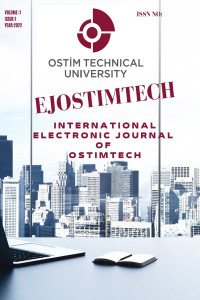Research Article
Issue Editorial Board





Aim & Scope
EJOSTIMTECH dergisi yerel, bölgesel ve uluslararası meseleler ve sorunlara değinen, iktisat, işletme, yönetim bilişim, uluslararası ticaret finansman, pazarlama ve sanayi politikaları alanlarında teorik makaleler ile nicel, nitel veya karma yöntemlerle gerçekleştirilen araştırma makalelerine yer veren bir dergidir..
EJOSTIMTECH journal is a journal that deals with local, regional and international issues and problems, includes theoretical articles in the fields of economics, business administration, management informatics, international trade finance, marketing and industrial policies.
Dergi bünyesinde ampirik araştırmalara dayanan çalışmalar, karşılaştırmalı çalışmalar, vaka çalışmaları ve ülke karşılaştırmalı çalışmaları ile ilgili disiplinler arası ve karşılaştırmalı yayınlar önem arz etmektedir.
Makale başvuruları akademik nitelik ve yöntemsel kalite temelinde değerlendirilir.
Aşağıda yer alan listede EJOSTIMTECH dergisinin yayın kapsamındaki temel alanlar yer almaktadır:
• Mikroekonomi/Makro Ekonomi
• Normatif, Pozitif İktisat
• Örgüt Kuramı& Örgütsel Davranış
• Pazarlama
• Sanayi Politikaları ve Endüstrileşme
• Uluslararası Politika ve Ekonomi
• Uluslararası Ticaret ve Finansman
• Yönetim Bilişim Sistemleri
• Yönetim, İnsan Kaynakları, Strateji
• İşletme Tarihi
• İktisat Tarihi
• İş Ahlakı
• Kamu Yönetimi
• Maliye
• Uluslararası İlişkiler
• Çalışma Ekonomisi
• Ekonometri
Research articles are conducted with quantitative, qualitative or mixed methods. Interdisciplinary and comparative publications on empirical studies, comparative studies, case studies and country comparative studies are important within the scope of the journal.
Article applications are evaluated on the basis of academic and methodological quality.
The list below includes the main areas covered by the EJOSTIMTECH Journal:
• Microeconomics/Macroeconomics
• Normative, Positive Economics
• Organization Theory & Organizational Behavior
• Marketing
• Industrial Policies and Industrialization
• International Politics and Economics
• International Trade and Finance
• Management Information Systems
• Management, Human Resources, Strategy
• Business History
• Economic History
• Business Ethics
• Public Administration
• Finance
• International Relations
• Labor Economics
• Econometrics
Author Guidelines
(1) Gönderilen yazılar, derginin yayımlanacağı platformda belirlenen yazım şablonuna uygun olarak düzenlenmelidir. Genel olarak, A4 boyutundaki kâğıdın bir yüzüne, üst, alt, sağ ve sol taraftan 2,5 cm. boşluk bırakılarak, 11 punto Times New Roman harf karakterleriyle ve 1 satır aralık ölçüsü ile ve iki yana yaslı olarak hazırlanmalıdır.
(2) Çalışmalar 4500- 10000 sözcük arasında olmalı ve sayfa numaraları sayfanın altında ve ortada yer almalıdır.
(3) Yazar/yazarların adları çalışmanın başlığının hemen altında sağa bitişik şekilde verilmelidir. Ayrıca yıldız dipnot şeklinde (*) yazarın unvanı, kurumu, e-posta adresi, ORCID numarası sayfanın en altında dipnotta belirtilmelidir.
(4) Çalışmaların başlıca şu unsurları içermesi gerekmektedir: Başlık, Öz (Amaç, Gereç ve Yöntem, Bulgular, Sonuç olarak kısımlara ayrılmalı, 120-250 kelimeden oluşmalıdır.), Anahtar kelimeler (3 ile 8 arasında değişebilir), Giriş, Ana metin bölümleri (Literatür taraması, Yöntem, Bulgular, Tartışma), Teşekkür, Son notlar ve Kaynakça.
(5) Metin içi alıntılama ve kaynak gösterme için APA (American Psychological Association) kaynak sitilinin 6. Edisyonu (http://www.apastyle.org/) kullanılmalıdır.
(1) Submitted manuscripts should be arranged in accordance with the writing template determined on the platform where the journal will be published. Generally, 2.5 cm. on one side of A4 size paper from top, bottom, right and left sides. It should be prepared with 11 pt Times New Roman letters, with a space left, and 1 line spacing and justified.
(2) Manuscripts should be between 4500-10000 words and page numbers should be placed at the bottom and middle of the page.
(3) The names of the author/authors should be given just below the title of the study, adjacent to the right. In addition, the title, institution, e-mail address, ORCID number of the author should be stated in the footnote at the bottom of the page in the form of an asterisk (*).
(4) Studies should contain the following elements: Title, Abstract (Aim, Material and Method, Findings, Conclusion, should be divided into parts, should consist of 120-250 words), Keywords (can vary between 3 and 8), Introduction, Main text sections. (Literature review, Method, Results, Discussion), Acknowledgments, Endnotes and Bibliography.
(5) For in-text citation and reference, the 6th edition of the APA (American Psychological Association) reference style (http://www.apastyle.org/) should be used.
(6) In the references in the text, the surnames of the authors and the publication date should be written in parentheses. If more than one source is to be shown, the (;) sign should be used between the sources. References should be listed alphabetically. Example: (Grady et al., 2019) or Grady et al. (2019)
(7) All sources used should be given at the end of the text in a separate section according to the surnames of the authors, without being numbered alphabetically.
(6) Metin içinde kaynak gösteriminde parantez içinde yazarların soyadı ve yayın tarihi yazılarak belirtilmelidir. Birden fazla kaynak gösterilecekse kaynaklar arasında (;) işareti kullanılmalıdır. Kaynaklar alfabetik olarak sıralanmalıdır. Örnek: (Grady et al., 2019) veya Grady et al. (2019)
(7) Kullanılan tüm kaynaklar metnin sonunda ayrı bir bölüm halinde yazar soyadlarına göre alfabetik olarak numaralandırılmadan verilmelidir.
a. Kitap/Book:
Sapolsky, R. M. (2017). Behave: The biology of humans at our best and worst. Penguin Books.
b. Kitap İçerisinde Bölüm/Chapter Within the Book:
Dillard, J. P. (2020). Currents in the study of persuasion. In M. B. Oliver, A. A. Raney, & J. Bryant (Eds.), Media effects: Advances in theory and research (4th ed., pp. 115–129). Routledge.
c. Makale/Article:
Grady, J. S., Her, M., Moreno, G., Perez, C., & Yelinek, J. (2019). Emotions in storybooks: A comparison of storybooks that represent ethnic and racial groups in the United States. Psychology of Popular Media Culture, 8(3), 207–217. https://doi.org/10.1037/ppm0000185
d. Yayımlanmamış Tezler/Unpublished Theses:
Harris, L. (2014). Instructional leadership perceptions and practices of elementary school leaders [Unpublished doctoral dissertation]. University of Virginia.
e. Yayımlanmış Tezler/Published Theses:
Kabir, J. M. (2016). Factors influencing customer satisfaction at a fast food hamburger chain: The relationship between customer satisfaction and customer loyalty (Publication No. 10169573) [Doctoral dissertation, Wilmington University]. ProQuest Dissertations & Theses Global.
f. Bildiriler/Papers:
Evans, A. C., Jr., Garbarino, J., Bocanegra, E., Kinscherff, R. T., & Márquez-Greene, N. (2019, August 8–11). Gun violence: An event on the power of community [Conference presentation]. APA 2019 Convention, Chicago, IL, United States. https://convention.apa.org/2019-video
g. Dergi yazıları/Journal articles:
Schulman, M. (2019, September 9). Superfans: A love story. The New Yorker. https://www.newyorker.com/magazine/2019/09/16/superfans-a-love-story
h.. Gazete yazıları/Newspaper articles:
Stobbe, M. (2020, January 8). Cancer death rate in U.S. sees largest one-year drop ever. Chicago Tribune.
i. Online anksiklopedi/Sözlük-Online encyclopedia/Dictionary: :
Marcoux, A. (2008). Business ethics. In E. N. Zalta (Ed.), The Stanford encyclopedia of philosophy. Retrieved from http://plato.stanford.edu/entries/ethics-business/
Ethical Principles and Publication Policy
(1) Dergiye gönderilen makalelerin incelenmesinde, COPE (Committee on Publication Ethics) tarafından belirlenen Editör ve Yazarlar için Uluslararası Standartlar ile ICMJE (International Committee of Medical Journal Editors) tarafından belirlenen yayın etiği ilke, standart ve tavsiyeleri dikkate alınır.
(2) EJOSTIMTECH Dergisi açık erişim ve ücretsiz akademik ve bilimsel yayıncılık ilkesine bağlı olduğundan, yazarlardan makale başvuru, değerlendirme ve yayın süreçlerinde herhangi bir ücret alınmaz.
(3) Tüm içeriğe, derginin web sayfası üzerinden herhangi bir kısıtlama olmaksızın yayın tarihinden itibaren tam metin olarak sürekli ve ücretsiz açık erişim sağlanır.
(4) EJOSTIMTECH Dergisi'nde yayınlanan özgün bilimsel çalışmalara Dijital Nesne Tanımlayıcı (DOI) numarası verilir.
(5) Makale göndermeden önce, uluslararası standartlar ve ilkeler esas alınarak belirlenmiş yayın etiği ilke ve politikaları ile derginin yazım kurallarının dikkatli bir şekilde okunması gerekmektedir. Yazarlar dergiye makale gönderdikleri zaman bu ilke ve kuralları kabul ettiklerini beyan etmektedir.
(6) Dergiye gönderilen makaleler öncelikle şekil ve içerik yönünden ön incelemeye tabi tutulur. Şekil şartlarının ve gönderim sürecinin derginin koşullarına uygun olarak yerine getirilmesi gerekmektedir. Bunlara uymayan çalışmalar editoryal redde tabidir. Şekil ve içerik olarak uygun bulunan makaleler hakem tayin edilmek üzere yayın kuruluna sunulur. Dergiye sunulan makaleler için hakemlik sürecine alınacağı garantisi verilmez. Buna ek olarak, makalelerin değerlendirme süresi için kesinlikle tarih verilmez.
(7) Yayın Kuruluna gönderilen eserler, hakemlerin olumlu görüşleri alınmak suretiyle yayınlanır.
(8) Dergiye gönderilen makaleler değerlendirilmek üzere makalenin alanı ile ilgili olan en az iki hakeme gönderilir. Hakem raporlarından birisinin olumlu, birisinin olumsuz gelmesi durumunda, yayın kararı dergi editörleri tarafından verilir. Gerekli görülmesi halinde, değerlendirilmek üzere makale üçüncü bir hakeme gönderilebilir.
(9) Editör, gönderilen makalelerin, yazarların din, dil, ırk, etnik köken, siyasi düşünce ve cinsiyet gibi özelliklerine bağlı olmadan sadece çalışmanın kalitesine ve hakem yorumlarına göre değerlendirmesinin yapılmasını sağlar.
(10) Editör, dergiye gönderilen yazılarla ilgili bilgileri gizli tutar, bu bilgileri sorumlu yazar, hakemler ve yayın kurulu dışında kimseyle paylaşmaz
(11) Editör, hakem değerlendirme sürecinin çift taraflı kör hakemlik ile yapılmasını sağlar, etik ihlaller durumunda makaleyi reddeder.
(12) Yazıların daha önce hiçbir yerde yayımlanmamış veya yayımlanmak üzere gönderilmemiş olması gerekir. Başka bir hakemli dergiye gönderilmiş fakat kabul almamış yazılar, yayın kurulu tarafından değerlendirmeye alınabilir. Herhangi bir bilimsel toplantıda sunulmuş fakat yayımlanmamış yazılarda, toplantının adı, yeri ve tarihi belirtilmelidir.
(13) Yazıların etik kurallara uygunluğu yazarların sorumluluğundadır. Diğer bilimsel yayınlara benzerlik oranın %15’i geçmemesi gerekir. Benzerlik oranı %15’ten fazla olan makaleler değerlendirilmeye alınmadan reddedilir. Bununla beraber editör, gerektiğinde yazarlardan etik kurul belgesi isteme hakkını saklı tutar.
(14) Yazıda dolaylı/dolaysız ticari bağlantı veya çalışma için maddi destek veren kurum mevcut ise, yazarlar bu durumu (yoksa da olmadığını) sunum sayfasında bildirmek zorundadırlar.
(15) Hakemler, zamanında ve yeterli olarak değerlendirebileceklerini düşündükleri çalışmalara hakemlik yapmayı kabul etmelidir.
(16) Hakemler, hakem incelemesinin gizliliğine saygı göstermeli ve bir makalenin inceleme süreci sırasında veya sonrasında, yayınlananların ötesinde çalışmayla ilgili hiçbir bilgiyi açığa çıkarmamalıdır.
(17) Hakemler, değerlendirmelerinde objektif ve yapıcı olmalı, kişisel yorumlar yapmamalıdır.
(18) Editör tarafından dergiye yayımlanmak üzere müracaat eden yazarlara yazının yayımlanma durumu değerlendirilerek yayımlanacak sayıda hakem olarak görev verilemez.
(19) 1976 Copyright Act'e göre, yayımlanmak üzere kabul edilen yazıların her türlü yayın hakkı dergiyi yayımlayan kuruma aittir. Yazılardaki düşünce ve öneriler tümüyle yazarların sorumluluğundadır.
1) In the examination of the articles submitted to the journal, International Standards for Editors and Authors determined by COPE (Committee on Publication Ethics) and publication ethics principles, standards and recommendations determined by ICMJE (International Committee of Medical Journal Editors) are taken into consideration.
(2) Since EJOSTIMTECH journal adheres to the principle of open access and free academic and scientific publishing, no fee is charged from the authors during the article application, evaluation and publication processes.
(3) All content is available on the web page of the journal, without any restrictions, as full text, free of charge, from the date of publication.
(4) Original scientific studies published in the EJOSTIMTECH journal are given a Digital Object Identifier (DOI) number.
(5) Before submitting an article, it is necessary to carefully read the principles and policies of publication ethics and the writing rules of the journal, which are determined on the basis of international standards and principles. The authors declare that they accept these principles and rules when they submit an article to the journal.
(6) The articles sent to the journal are firstly subjected to preliminary examination in terms of form and content. The format requirements and the submission process must be fulfilled in accordance with the journal's conditions. Works that do not comply with these are subject to editorial rejection. Articles that are found suitable in terms of form and content are submitted to the editorial board to be appointed as a referee. There is no guarantee that the articles submitted to the journal will be included in the refereeing process. In addition, no date is given for the evaluation period of the articles.
(7) The works sent to the Editorial Board are published after receiving the positive opinions of the referees.
(8) The articles sent to the journal are sent to at least two referees related to the field of the article for evaluation. If one of the referee reports is positive and the other is negative, the publication decision is made by the journal editors. If deemed necessary, the article can be sent to a third referee for evaluation.
(9) The editor ensures that the submitted articles are evaluated only according to the quality of the study and the comments of the referees, regardless of the characteristics of the authors such as religion, language, race, ethnicity, political thought and gender.
(10) The editor keeps the information about the articles sent to the journal confidential and does not share this information with anyone other than the responsible author, referees and the editorial board.
(11) The editor ensures that the referee evaluation process is carried out with double-blind refereeing, and rejects the article in case of ethical violations.
(12) Manuscripts must not have been previously published anywhere or sent for publication. Manuscripts submitted to another peer-reviewed journal but not accepted can be evaluated by the editorial board. In the manuscripts presented but not published in any scientific meeting, the name, place and date of the meeting should be stated.
(13) Compliance of manuscripts with ethical rules is the responsibility of the authors. The similarity rate to other scientific publications should not exceed 15%. Articles with a similarity rate of more than 15% are rejected without being evaluated. However, the editor reserves the right to request an ethics committee document from the authors when necessary.
(14) If there is an indirect/direct commercial link in the article or an institution that provides financial support for the study, the authors are obliged to report this situation (or not) on the submission page.
(15) The referees should agree to referee the works they think they can evaluate as timely and adequate.
(16) Reviewers should respect the confidentiality of peer-review and should not reveal any information about the work beyond what has been published during or after the review process of a manuscript.
(17) Referees should be objective and constructive in their evaluations and should not make personal comments.
(18) Authors who have applied to the journal for publication by the editor cannot be assigned as referees in the number to be published by evaluating the publication status of the article.
(19) According to the 1976 Copyright Act, all copyrights of the articles accepted for publication belong to the institution that published the journal. The thoughts and suggestions in the articles are entirely the responsibility of the authors.
Price Policy
Makale gönderim/süreç işletimi ücretsizdir.







